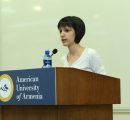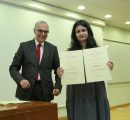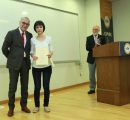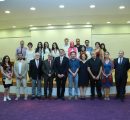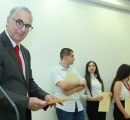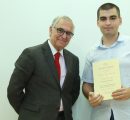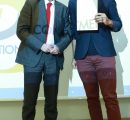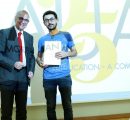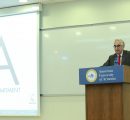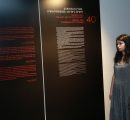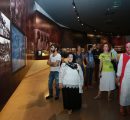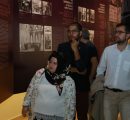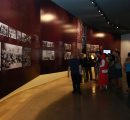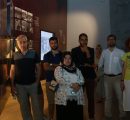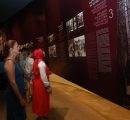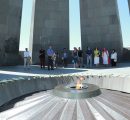
Armenian and Turkish Students Build a Bridge of Understanding through the Literary Arts, Brought Together by the Arditi Foundation at AUA
7 min readYEREVAN, Armenia – On June 30th, the American University of Armenia (AUA) hosted an award ceremony sponsored by the Arditi Foundation to announce the winners of the essay writing competition titled “A Difficult Dialogue” among Armenian and Turkish university students. The competition was announced in January of 2016, and was closed in April of 2016. A similar initiative for intercultural dialogue was successfully implemented between Israeli and Palestinian students as a cornerstone to bridge peace between the youth during times of conflict.
Students from the American University of Armenia, Yerevan State University, Bilgi University, Boğaziçi University, Sabancı University and Şehir University participated in the competition. Students and faculty members from Turkey were invited to Armenia by the Arditi Foundation to receive their prizes.
Twenty-five years ago, when AUA was established, an overarching goal was to create an institution that would promote and instill critical and innovative thinking. Parallels can be drawn from AUA’s mission and the goals of the Arditi Foundation, including freedom of expression in the academic setting. AUA supported and encouraged students to take the opportunity to engage in a challenging discourse by participating in the competition.
This year, freedom of imagination in the setting of the University of Geneva, Switzerland, in the year of 2025 was the theme of the competition. Two students meet, one of them is Armenian, the other Turkish. The rest of the plot, character development, and dialogue was up to the participating writer.
The aim of the competition was to give the participants the opportunity to obtain literary quality in their writing by putting herself or himself in the shoes of each character, even when being in personal disagreement with the character’s ideas or values. To many of the participating students, writing the essay was one of the most challenging tasks they had ever accomplished. “The dialogue in the stories was deemed difficult due to the nature of the history between the two nations”, stated AUA student Ani Baghumyan.
The first, second, and third place winners from each participating university from Armenia and Turkey received awards of $2,000, $1,000 and $500, respectively. AUA’s first place winner was Ani Baghumyan for her essay titled “The Story of a City”, the second place winner was Anna Grigoryan for her essay titled “A Cup of HumaniTea”, and the third place winner was Donara Sargsyan for her essay titled “The Test”. All three students study English and Communications at AUA. Ani Baghumyan is a Roxie and Alice Maseredjian Chooljian Legacy Scholarship recipient, and Donara Sargsyan is a Turpanjian Foundation Scholarship recipient.
All the first place winning stories from the participating universities were submitted for a final competition round, decided by a team of referees consisting of the members of the board of the Arditi Foundation and representatives from the participating universities.
The first place for the prize of $5,000 was shared between AUA student Ani Baghumyan, and Bilgi University student Baki Karakaya.
The AUA faculty was impressed with the essay submissions from the students. The experience enabled the students to not only apply their writing skills acquired at AUA, but enhance their literary abilities for a desirable reward and a higher academic reputation. Jury Committee members, AUA Senior Lecturer and Jury Committee Chair Arto Vaun, AUA Adjunct Lecturer Shushan Avagyan, AUA Lecturers Vahram Danielyan, Siranush Dvoyan, and Maria Titizian, had the daunting task of selecting 3 essays out of 28 submissions.
Arto Vaun explained that the committee was able to distinguish a particular theme in the three selected stories, and although they all had different plots, the common thread was a strong command of language, imagination, and creativity. “All three stories addressed something very historical, specifically the genocide, without actually mentioning it,” Vaun elaborated on how challenging such a task may be, “It’s really difficult to write about anything historical without taking away the innovative elements of a story. But they did an outstanding job in portraying a very human connection in their characters who come from different backgrounds. If there was any turmoil or conflict brought up, it was resolved on a very sophisticated and intimate level.”
For many Turkish students and faculty members, it was their first visit to Armenia, all made possible by the Arditi Foundation. During his first visit to Armenia, Veysel Oztur, an associate professor at Boğaziçi University in Istanbul claimed, “I was excited to hear that we had the opportunity to come to Armenia, personally, I wanted to see what Turkey was like from the other side. I also think it’s important for Turkish students to come here and interact with Armenian students. I know the Armenian culture and heritage has influenced the Turkish culture and heritage greatly, even when it comes down to literature. Events like the Arditi Foundation Essay Writing Competition is one of the best ways to bridge the youth together, they are possibly the next generation of leaders and peacemakers. As faculty members, we try to foster an environment that allows any open discourse.”
The visiting faculty and students from the Turkish universities arrived on June 29th, and had a full itinerary organized by AUA, led by Visiting Senior Lecturer Vahram Ter-Matevosyan who was involved with organizing the competition. Ter-Matevosyan led the visitors to the Genocide Memorial Complex, and Matenadaran (Scientific Research Institute of Ancient Manuscripts). AUA hosted a lunch with the guests and AUA staff and faculty, followed by a tour of the campus. Before the award ceremony commenced, the guests had an opportunity to walk around Yerevan. After they had returned to accept their prizes, the guests and all participating university students and representatives had the chance to get to congratulate one another during a celebratory reception hour.
The following day the guests took an excursion to Garni Temple and Geghard Monastery before their departure.
During the visit to the Genocide Memorial and Museum at Tsitsernakaberd in Yerevan, the group of students and faculty from Turkish universities were able to gather more historical details, facts, stories, and emotions about the Armenian Genocide in ways they haven’t been able to experience before. Boğaziçi University Faculty Member Aylin Vartanyan, who is Armenian by heritage and was born and raised in Istanbul, focuses on teaching conflict resolution through the literary arts. She stated, “I am thankful for the Arditi Foundation for bringing the 6 Universities from Turkey and Armenia together. And I believe in arts in the aesthetic space, and that space makes the impossible possible, the invisible visible, and the unspeakable speakable. I am proud of all the students who participated in this contest and had the courage in taking this journey of encountering the other in their stories, and bringing a symmetrical dialogue between two people of the future.”
Ms. Vartanyan played a key role in convincing the students and faculty to get on the plane to Armenia despite the recent tragedy that took place in the international terminal of the Istanbul Ataturk Airport in the capital of Turkey. Shortly after, 6 students and 5 faculty members of the participating Turkish universities had to decide if they would take the courageous leap and fly out to Armenia the very next day, out of the same airport.
“We knew we were walking into a crime scene,” stated Kim Luana Fortuny, an American faculty member of Boğaziçi University, “there were broken windows everywhere and it felt very dangerous. As scared as we all were, the students themselves expressed that they no longer wanted violence to ever get in the way when striving for peace. They had come too far to give up.” And for the sake of peace, they came.
In his opening remarks, AUA President Armen Der Kiureghian expressed pride hosting the award ceremony. When addressing the Armenian and Turkish students alike, he advised, “As university students you have a special role in fostering dialogue, and understanding friendship between nations. Young people like you with fresh outlook on life and free of constraints and obligations, typically are keen on seeking the truth, understanding other points of views, and advocating for justice. Through your higher education and knowledge, you have acquired confidence and wisdom, which will continue to grow as your life experiences will take you through paths of diverse interactions. Through these experiences we hope that you will feel empowered to initiate and pursue openness, dialogue, and discourse with one another with the goal of forging a bright future for the common good. Let this award ceremony be just the beginning.”
Swiss Ambassador to Armenia H.E. Lukas Gasser was acknowledged for acquainting the Arditi Foundation with the American University of Armenia. He then took the stage to honor Metin Arditi’s esteemed accomplishments and impact made in Switzerland.
Following Ambassador Gassers introductory remarks, Metin Arditi, addressed the brave decisions of the students and faculty members from the Turkish universities attending the award ceremony, “By coming to Yerevan under very difficult conditions, you demonstrated great courage and a strong determination in having “A Difficult Dialogue” pursued. I want to express my hope, because if a people can confront its present under such difficult conditions with such strong determination, then I think they can certainly confront its past under any hypotheses.”
Metin Arditi expressed hope to launch a second edition of the writing competition in the fall to continue his mission of reconciliation between the two countries through literature. “I was born in Turkey, in a minority. In Ankara, like in Istanbul, the Jewish and Armenian communities were close. As a Jew, I support the Jewish-Arab dialog. As a Turk, born close to the Armenian community, I have the same sentiment of urgency for a true dialog. And, there is nothing more powerful for this than literature,” he stated.
In continuing to observe the discourse within and between the neighboring countries of Israel and Palestine, with Turkey and Armenia, Metin Arditi reflected, “What emerged besides the content was evidence that Armenians are more informed of the problem in their lives and family memories, as compared to the young Turks to whom no one had ever spoken of it, though the merit of their writing was also great. The subject of the communication between Turks and Armenians is 100 times more taboo than between the Jews and Arabs in Israel. The breakthrough gained, thanks to the writing contest, was even more powerful. The Jews and Arabs argue and fight, but that’s a form of communication. They live side-by-side and see each other. In Armenia, it has been a century where they have not spoken or seen each other, and the border is closed. Speaking of reconciliation can be dangerous in Armenia, because people wish that there will be an awareness before long. The representatives of the Turkish universities who came to Yerevan were doubly courageous.”
Metin Arditi was born in Ankara, in a Jewish Sephardic family, and left Turkey at the age of seven to study in Switzerland. He lives in Geneva, where he is very involved in the cultural and artistic life of the city. He is a writer, businessman, lover of music.
In 1988, he created the Arditi Foundation, which awards fifteen annual prizes to graduates of the University of Geneva and the Swiss Federal Institute of Technology. He is the founder of “The Instruments of Peace Foundation”, which offers musical education to children of Palestine and Israel.
Metin Arditi served as a UNESCO Goodwill Ambassador from December of 2012 through June of 2014. He has undertaken a number of peace and development projects during that time. Goodwill Ambassador Arditi also initiated a series of public conferences at the University of Geneva to raise public awareness of the vital role of culture in peace-building and the need to preserve heritage in times of conflict.
In June 2014, Metin Arditi was designated as a UNESCO Special Envoy for Intercultural Dialogue.
Selected essays by the AUA Jury Committee:
- First Place: Ani Baghumyan for essay titled “The Story of a City”
- Second Place: Anna Grigoryan for essay titled “A Cup of HumaniTea”
- Third Place: Donara Sargsyan for essay titled “The Test”
Selected essays by the YSU Jury Committee:
- First Place: Arshak Gevorgyan for essay titled “Stalemate”
- Second Place: Marianna Ananyan for essay titled “Ռաբիա”
- Third Place: Anna Sargsyan for essay titled “Feud or Friendship”

